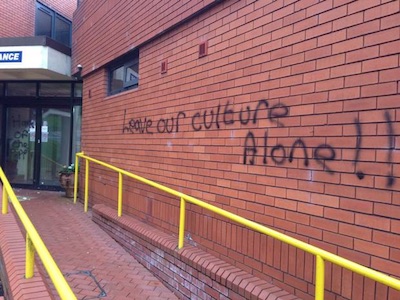
There was a hoax bomb attack and graffiti sprayed on council buildings in Dungannon as the north’s new ‘super councils’ finally took up power as part of a shake-up of local government in the north of Ireland.
All 26 councils in the Six Counties have been replaced with 11 new local authorities as part of the controversial reforms.
The enlarged councils have been operating in ‘shadow’ form for the past year but have now take over running of local services. Additional powers have also been handed to the new authorities, including decisions on local planning and tourism.
The councils have so far elected five Sinn Fein mayors and six DUP mayors, prompting accusations of a political ‘carve-up’. Four of the new councils have nationalist majorities and six are in unionist control, while Alliance holds the balance of power in Belfast.
But there were a number of rows as the new councils took shape.
A hoax bomb alert, which caused the closure of the Dungannon office of the new Mid-Ulster District Council for a period on Friday morning as a controlled explosion was carried out, came amidst a row over the council’s policy on flags and emblems.
Loyalists were blamed after graffiti stating “leave our culture alone” and “hands off the poppy” was sprayed on the walls of the office.
Mid-Ulster District Council, which incorporates the former Dungannon, Magherafelt and Cookstown councils, voted last month to have no poppies or Easter lillies for sale or flags on display at council buildings.
Earlier in the week DUP East Derry MP Gregory Campbell referred to the council as an area where “already there are signs of old style Irish republican aggression on display”.
Mr Campbell said: “The days of riding roughshod over the wishes of unionist minorities not only have to be over, but must be seen to be over as well.”
In the new Mid and East Antrim super-council, the hardline unionist TUV refused to appear in a photograph with the new deputy Mayor, Sinn Fein’s Patrice Hardy. TUV councillor Timothy Gaston said he was “unapologetic”, describing Sinn Fein as “a party which glorifies murder and terrorism”.
In the Fermanagh and Omagh District Council chamber this week, every DUP and UUP councillor walked out of the council chamber ahead of a debate on the right of Irish citizens in the North to vote in the Irish Presidential elections, declaring it “irrelevant”. The motion passed 19-0.
Unionists also reacted angrily after the nationalist-dominated Newry, Mourne and Down Council decided to put Irish first on its logos, literature and vehicles. Former DUP minister Nelson McCausland accused nationalists of engaging in an exercise in “cultural sectarianism”, but nationalists said they had always operated a bilingual policy on the council.
‘PROGRESSIVE’
Overall, councillor numbers have been reduced by a fifth, from 582 elected representatives to 462, but councillor salaries have increased by almost 50% in the transition. Large pay-offs have also been made to retiring councillors and council executives amid the dismantling of the old structure.
Sinn Fein Deputy First Minister Martin McGuinness has said the new councils will create new opportunities to embrace equality and promote new progressive alliances.
He said the larger councils present an opportunity to do things “differently and better”.
“Councils in which Sinn Fein are a significant influence must become models of equality, inclusivity and partnership,” he said.
“They must take the lead in the challenging task of reconciliation and provide an alternative to the triumphalism and domination which characterised unionist domination in local government in this state for so long.
“So we must at all times stand for equality and seek out progressive alliances to do so.”
![[Irish Republican News]](https://republican-news.org/graphics/title_gifs/rn.gif)
![[Irish Republican News]](https://republican-news.org/graphics/title_gifs/harp.gif)

